US Gov. Casts Doubt On Wrongful Detainment Of Shahab Dalili In Iran
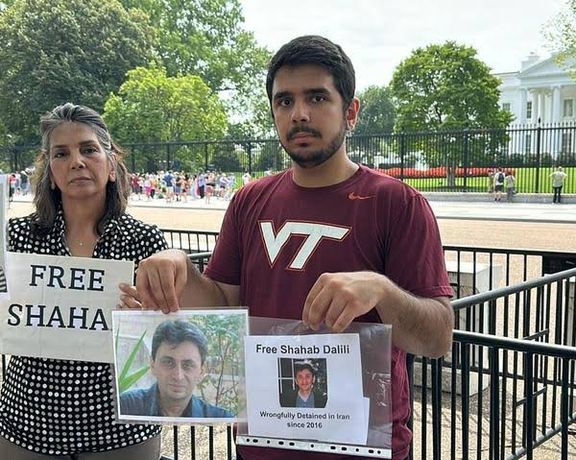
The family of a detained US permanent resident left out of a hostage release deal between Iran and the United States demand fair treatment.

The family of a detained US permanent resident left out of a hostage release deal between Iran and the United States demand fair treatment.
On the fifth day of a sit-in protest that has moved from outside the White House to the US State Department's premises, the family of Shahab Dalili, is calling for his release as part of the Tehran-Washington agreement.
On Monday, Deputy Spokesperson Vedant Patel of the US State Department addressed the situation during a press conference, casting doubt on whether Dalili's case falls under the category of "wrongfully detained.”
Dalili, a former captain of Iran Shipping Company and a US resident, was arrested during a trip to Tehran in 2016 for his father's funeral, after which he was apprehended by Iranian security forces.
Patel said, “and what I would say in the case of Mr. Dalili is that that case has not yet been determined wrongfully detained. We obviously don’t discuss the specific details of individual cases who have not been deemed wrongfully detained.”
This contradicts previous remarks by US Secretary of State Anthony Blinken, who said on August 19ththat there were no other American citizens imprisoned in Iran apart from the five known detainees.
Shahab Dalili's son, Darin Dalili, expressed disappointment and disagreement with the Deputy Spokesperson's statement, deeming it "incorrect." In response to the family's concerns, Patel clarified that the US was actively investigating Dalili's case and had engaged in discussions with the family regarding his situation.
Undeterred by the conflicting messages, the family continue their sit-in outside the US State Department.
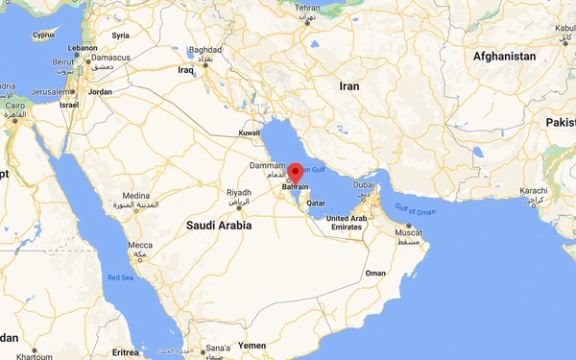
The Iranian regime has launched a propaganda campaign to blame the late Shah for losing Bahrain as part of Iran, but it was actually lost a century before.
Tehran's municipality controlled by Regime hardliners has installed numerous billboards across the capital accusing the Pahlavi dynasty -- the last monarchs of Iran -- of “selling out the homeland,” a claim that is historically wrong but indicative that the regime feels threatened by popular nostalgia about the Pahlavi era.
The regime’s propaganda line is also echoed by several officials, such as government spokesman Ali Bahadori Jahromi, who shared a collage of news pieces dating back to mid-August 1971 when Bahrain declared independence. However, the independence was not from Iran; but from the United Kingdom.
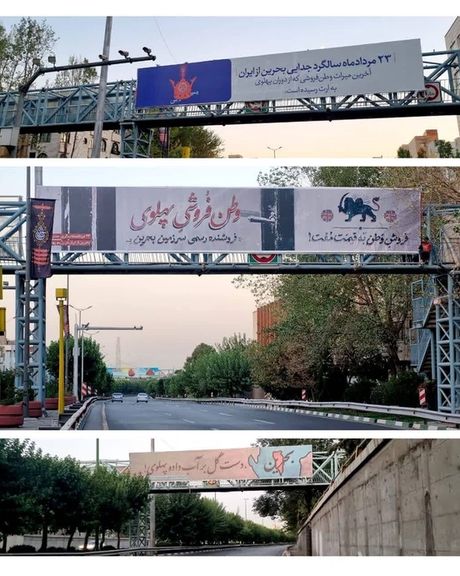
Bahrain was a dependency of the Persian Empire when in 1783 the Bani Utbah tribe led by Al Khalifa invaded the territory from their base in current-day Qatar. Ahmed ibn Muhammad ibn Khalifa -- the progenitor of the dynasty, known as Ahmed the Conqueror, expelled the Iran-installed governor. His successors kept Bahrain under their control over the next decades, and Tehran’s loose grip was completely lost in 1861, when Britain acknowledged Al Khalifa family as its rulers.
Since the treaty with Britain, until independence in 1971, Bahrain was virtually a British protectorate, where the British king was the supreme authority and members of the Sunni Muslim ruling family held the main political and military posts. Although August 15 is the date when Bahrain gained its independence from Britain, the kingdom celebrates December 16 as its National Day, the date of Emir Isa bin Salman Al Khalifa’s ascension to the throne in 1961.
The Pahlavi dynasty, founded by Reza Shah Pahlavi, replaced the Qajar dynasty in 1925. Since then, both Reza Shah and after that his son Mohammad-Reza Shah tried to reclaim Bahrain and negotiated with the British on several occasions but to no avail. Different Iranian governments and the Pahlavi kings themselves repeated the claim over Bahrain and even passed a bill in 1957 to officially announce Bahrain as one of the provinces of Iran, but in practice the legal status of the Arab-majority archipelago remained the same.
Mohammad-Reza Shah, who was also engaged in a similar battle for three Iranian islands of Abu Musa and the Greater and Lesser Tunbs, finally announced during a trip to India in 1969 that if the people of Bahrain were not willing to become part of Iran again, Tehran would withdraw its territorial claims. The Shah emphasized that Iran is not seeking to use force for the annexation of Bahrain. “I want to say that if the people of Bahrain do not wish to join our country we shall never resort to force, because it is against the policy of our government to use force ... Our policy and philosophy is to oppose occupation of other territories by force."
Following a United Nations survey – a controversial poll sometimes referred to as a "referendum" -- on whether islanders preferred independence or Iranian control, the United Nations Security Council unanimously passed Resolution 278 on May 11, 1970, and subsequently Bahrain became independent from the United Kingdom. Despite opposition by several Iranian lawmakers at the time, the government accepted the decision and Iran was the first country to congratulate Bahrain for its independence in August 1971.
About three months later, the Imperial Iranian Navy seized the three Persian Gulf islands shortly after the withdrawal of British forces from the Persian Gulf while the Emirate of Ras al-Khaimah claimed the Greater and Lesser Tunbs and the Emirate of Sharjah claimed Abu Musa. Both emirates then acceded to the newly formed United Arab Emirates, but they still reiterate claims over the islands every now and then.
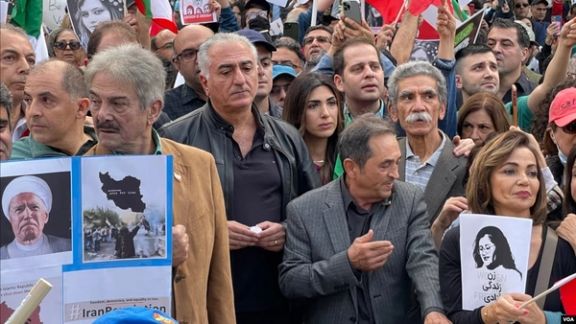
Today, the Islamic Republic regime does not talk about the historical events that led to the independence of Bahrain and only uses it as a ploy to tarnish the Pahlavis, whose popularity has been rising again among the Iranians. During anti-regime protests – especially the current wave sparked by the death of Mahsa Amini in police custody – people chant in support of late kings Reza and Mohammad-Reza, while the exiled prince Reza Pahlavi has become a leading opposition figure touring the globe to make the voice of Iranians heard.
The smear campaign against the Pahlavis is in line with the regime’s new tactics of soft war, labeled by Iran’s ruler Ali Khamenei as ‘vindication jihad’ (jihad tabyyin). In recent years, Khamenei has applied the phrase to efforts both in the media and on social media platforms to provide new interpretations – as well as fake history in case of Bahrain – to portray the regime better than what it really is.
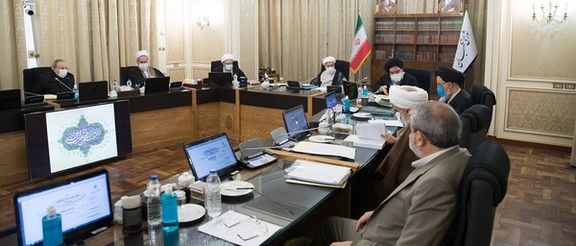
While the approaching parliamentary elections in March fail to generate enthusiasm among Iranians, the media diligently covers what analysts and regime figures say.
This is part of the regime's strategy to stoke anticipation, giving the impression that noteworthy developments might unfold. However, the electorate's disillusionment stems from the heavily manipulated elections of 2020 and 2021, which ushered in one of the most ineffectual parliaments and governments in recent national history.
Analysts in Tehran attribute the public's indifference to the government's insistence on limiting election choices to ultraconservative candidates, combined with the political system's inability to address a multitude of crises. This ambivalence is akin to perceiving the elections as transpiring in a different realm. The people's sentiment is perhaps best captured by the Persian proverb, which roughly translates to "If the pot is not boiling for me, let them cook whatever filthy beast they want to cook."
In their daily efforts to "heat up the stove," the media seized the opportunity on Sunday to bring familiar names to the forefront. Speculation emerged that Ali Motahari, a controversial conservative former legislator known for cautiously criticizing Supreme Leader Ali Khamenei, might contend for a parliamentary seat. Etemad Online wrote that Motahari is one of the nearly 30,000 people who have taken part in early candidate registration.
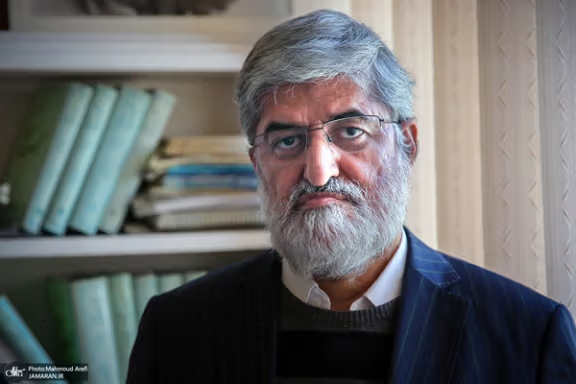
Another round of conjecture circled on Sunday, this time involving former Majles Speaker Ali Larijani as a potential candidate. After weeks of oscillating reports regarding his intentions, a political figure close to Larijani, Behrouz Nemati, revealed that Larijani himself wouldn't run, but he intends to endorse a slate of like-minded candidates.
Larijani's reluctance to participate in the elections, following his highly questionable disqualification in the 2021 presidential race, was evident. However, if he were to run for a position, it would likely be for Iran's presidency, given his prior leadership of the Parliament. The role of Speaker, once easily attainable due to Khamenei's support, now poses a greater challenge for him.
Notwithstanding, Nemati called on the public to turn out in significant numbers to contribute to a high-turnout election, thereby bolstering the regime's legitimacy, which has been eroded, particularly after the 2022 nationwide protests.
On the same day, former reformist President Mohammad Khatami was quoted as having said that the country's leaders call on the reformists to participate in the upcoming elections but they take every step to make sure that reformists are not allowed to run. Khatami, who was meeting with leading reformists, referred to media attacks from hardliners targeting his recent calls for reforms to save the regime.
Discussing the verbal assaults from the hardline daily Kayhan and other ultraconservative figures, Khatami observed, "The government now interprets suggestions for reform as some kind of deviation."
Meanwhile, Mohammad-Reza Aref, a former vice-president under Khatami's leadership, is expected to run, despite his past perceived inactivity in the parliament. Shunned by other reformists for his aloof behavior when he was the leader of the reform caucus in the parliament, now Aref can hardly be categorized as a reformist.
Although certain media outlets prematurely assess the composition of the forthcoming parliament, most politicians recognize that unless Supreme Leader Ali Khamenei alters his stance within the next five months, there will likely be limited room for moderate or reformist candidates.
The government may attempt to portray certain figures in the next parliament as less hardline or even persuade select individuals within the ultraconservative camp to make occasional controversial statements, simulating diversity and drawing attention.
The depth of disillusionment regarding a free and equitable election is so pronounced that even figures like Mohammad Javad Bahonar, formerly regarded as a hardline conservative, lament that the regime no longer views them as insiders. As the regime fans the flames of anticipation, few authentic politicians would willingly become fuel for the fire.
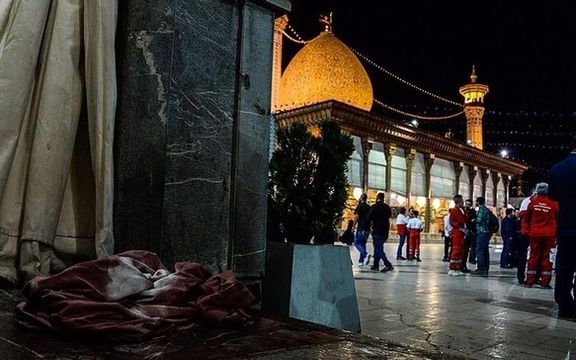
A second Iranian injured in an attack by a gunman at a religious shrine on Sunday has died in hospital.
Iranian media reported the passing of Mohammad Jahangiri, a member of the Shahcheragh security forces who had sustained injuries in the attack on Sunday. Despite undergoing two surgeries, Jahangiri succumbed to his wounds due to a gunshot injury to the abdomen, as reported by ISNA.
Amidst the unfolding situation, a senior commander of the Islamic Revolutionary Guard Corps (IRGC) accused Israeli Tuesday of involvement in the attack.
Yadollah Bouali, Commander of the IRGC in Fars Province where the incident took place, disclosed on Tuesday that the shooter operated within a wider network, suggesting that the network's activities span across multiple countries and maintain links to Israel. Bouali also claimed the network operated over a month in Shiraz before targeting the shrine.
He claimed that "More than 10 individuals have been apprehended thus far," and emphasized that the perpetrator was equipped with one of the "most sophisticated firearms."
Earlier, the Mizan News Agency, affiliated with the Islamic Republic's judiciary, had reported the detention of eight foreign suspects associated with the incident.
Additionally, on Monday, Ramzan Sharif, the IRGC spokesperson, refuted claims attributing the attack to an Afghan national, noting that the suspect's nationality would be disclosed in due course.
In a parallel development, the Chief Justice of Fars Province identified the attacker as Rahmatollah Nowruzov, and said he is a Tajik national.
This incident bears a striking resemblance to a previous incident in October, when a gunman, identified as a Tajikistan citizen, entered the shrine, opened fire, and subsequently lost his life after being shot. The October incident coincided with anti-regime protests, raising speculation and accusations of orchestrated tactics by the government. In a similar vein, Iran publicly executed two Afghan nationals in July, accused of aiding the primary perpetrator of the October attack.
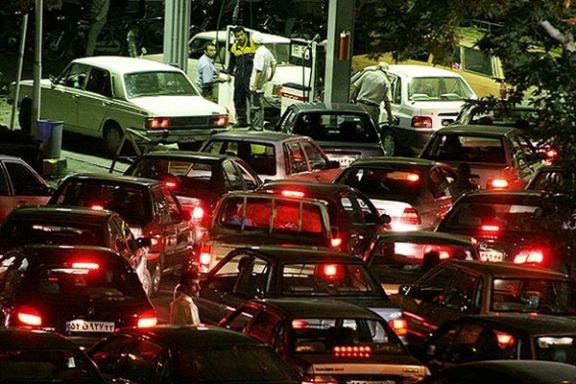
Shortages of gasoline in Iran and refueling limits, as well as rumors of an impending price hike have led to long queues at gas stations across the country.
Despite repeated denials of a fuel crisis by government media -- which blame the disruption in the supply chain on summer travels -- Iranians see the long lines of cars as a prelude to protests that may engulf the country even before the anniversary of last year’s protests in mid-September.
The congestion at gas stations started in small towns and cities earlier in the month but as of Tuesday, numerous videos have emerged on social media showing long queues of vehicles waiting to fill up in the capital Tehran, Kerman, Karaj, Kermanshah, as well as several cities in border provinces.
Media outlets affiliated with the government and the Revolutionary Guard have published several reports in the past few days claiming that technical issues such as out of order fuel pumps and nozzles have caused the problem. Jam-e Jam newspaper, owned by Iran's state broadcaster, claimed that delays to get fuel to the stations and problems with smart cards that keep tabs on the customers' rations have caused the crisis.
Meanwhile, there are reports that fuel black markets have formed in several cities, with prices closer to international levels. The government, which controls one of the world's largest oil and gas reserves, sells gasoline at extremely low, subsidized prices, charging less than 10 US cents per gallon, or less than 3 cents per liter, while neighboring oil-producers have much higher prices, in line with international market rates. Second only to Venezuela, Iran has the world’s cheapest gasoline price.
According to the reformist Ham-Mihan newspaper, in several cities in Sistan-Baluchistan province, a 20-liter can of gasoline is being sold for 4,000,000 rials or $8, about seven to eight times higher than the highest government price.
One of the main reasons that the Islamic Republic has not managed to increase prices in the midst of the current economic crisis is because it faced the worst wave of unrest in years since September 2022. A fuel price hike would risk fanning the flames of unrest further.
For years there has been talk of adjusting prices, but since 2018 Iran’s currency has dropped 12-fold and any increase needs to be huge to be meaningful in US dollars. In November 2019, a government decision to increase fuel prices by 50–200 percent triggered nationwide unrest that lasted for two weeks. Regime forces killed at least 1,500 civilians, in the worst such crackdown in Iran.
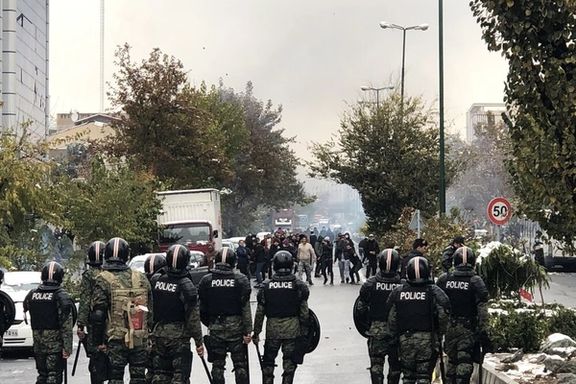
Iran has been struggling with gasoline shortages since at least the beginning of the summer of 2022 and was forced to release one-third of its strategic reserves by the end of the same year. A source at the oil ministry told Iran International that the National Iranian Oil Refining and Distribution Company (NIORDC), a department within the ministry, has released around 900 million liters of strategic gasoline reserves into the market.
Adding to the misery, an informed Iranian oil ministry official told Iran International on Monday that Russia has ceased its gasoline exports to Iran for the past few months.
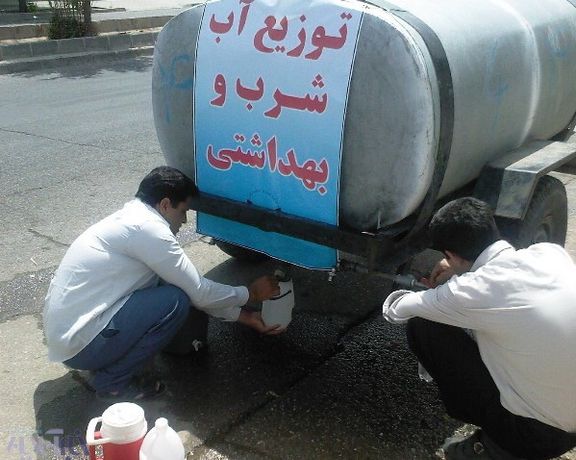
Over 260 cities are facing severe water shortages across Iran, says a leading official in Iran’s water industry.
Addressing inquiries during a session focused on the nation's water industry, Hashem Amini, the deputy head of National Water and Wastewater Company, said that the situation had reached national crisis level in various regions. A particular concern, he highlighted, is drinking water shortages from the Dousti Dam in Mashhad and the Nahand Dam in the northwestern city of Tabriz.
He further cautioned about the precarious state of groundwater in Zanjan, Tabas, and cities in Sistan and Baluchestan province, saying that these vital water sources were also in significant decline over the past two years.
However, during the session, Amini countered his claims, saying that new water supply projects across the country would address the issue.
Adel Peyghami, the CEO of the Qeshm Free Zone, also stressed the need to address water security, saying that "people do not have water" on Qeshm Island. He also said that Islamic regime authorities had urged him not to overstate the situation.
While drought contributes significantly to Iran's water stress, inefficiency in water management has compounded the crisis. It is estimated that a quarter of the country's treated water is wasted, further highlighting the need for improved water management practices.